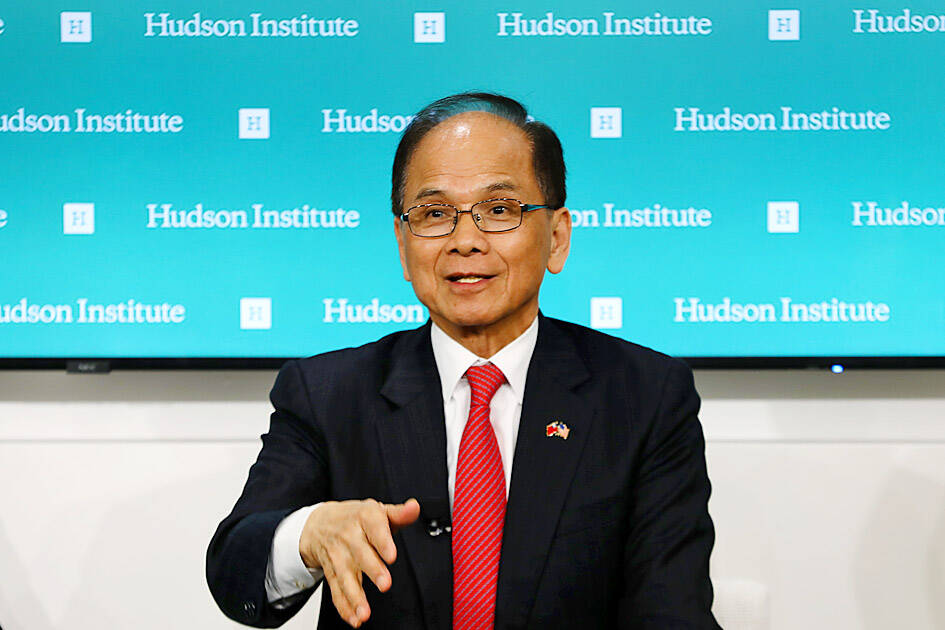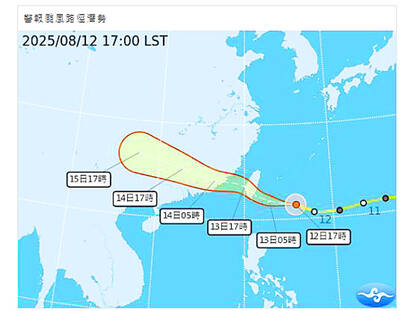China will not be satisfied with taking over Taiwan, as the nation is only a “stepping stone” to Beijing’s ambitions for global power, Legislative Speaker You Si-kun (游錫?) said in a speech at a US think tank on Tuesday.
“Taiwan is not [Beijing’s] ultimate goal or final destination,” he told the Washington-based Hudson Institute, adding: “The CCP [Chinese Communist Party] wants to see the East to rise and the West to decline; it wants to be hegemon over Europe, the Americas, and the entire world.”
You is leading a legislative delegation that includes Democratic Progressive Party Legislator Chen Ting-fei (陳亭妃), Taiwan People’s Party caucus whip Chiu Chen-yuan (邱臣遠) and New Power Party caucus whip Chiu Hsien-chih (邱顯智).

Photo: CNA
Chinese President Xi Jinping (習近平) has openly embraced a strategy to “upend the international order” after abandoning notions of China biding its time or pursuing a peaceful rise, he said.
China’s imperialism stems from the CCP regime’s authoritarianism and subscription to Confucian traditions that call for the whole of the world to be subjected to one ruler, he said.
“Protecting Taiwan equates to defending both Europe and the US; to ensure Taiwan’s security is to ensure the global public interest,” You said.
“If we do not take China’s threats seriously, a dark future awaits all of mankind,” he added.
The world should be confident in Taiwan’s will and ability to resist communist aggression, he said, adding that it took imperial Japan nearly six months to subjugate Taiwan proper in 1895.
Taiwan’s heritage of resisting foreign invaders, formidable geography, arms obtained from the US and Taiwanese’s will to resist their foes show that the nation would stand up to aggression, You said.
However, the nation’s strength alone is not enough stop China’s onslaught and it needs support from the US, Europe, Japan and South Korea, You said.
You praised Japanese Prime Minister Fumio Kishida and South Korean President Yoon Suk Yeol for calling Taiwan a global issue and opposing a change to the status quo by force. He said this had “offset” remarks by French President Emmanuel Macron that a conflict in the Taiwan Strait had nothing to do with Europe.
You said Philippine President Ferdinand Marcos Jr had also said that granting the U.S. access to Philippine military bases was a defensive measure that would be useful if China were to attack Taiwan.
“The crescent of defense formed by Korea, Japan, Taiwan and the Philippines will, with American support, be a key stabilizer of peace and security in the Indo-Pacific region,” he added.
The staunch support democracies have provided Ukraine should act as a deterrent to Xi “to prevent him from taking any reckless action so that he will not become a second Putin,” You said.
The delegation has met with members of the US House of Representatives Select Committee on Strategic Competition between the US and the CCP, You said.
The groups also talked about US Representative Seth Moulton’s remarks that were used out of context by Chinese social media platforms.
Moulton said during a panel discussion that “one of the interesting ideas that’s floated out there for deterrence is just making it very clear to the Chinese, that if you invade Taiwan, we’re gonna blow up TSMC [Taiwan Semiconductor Manufacturing Co, 台積電].”
“I’m not promoting the idea. I’m not promoting the idea,” Moulton said.
However, his words were clipped to the effect that the US might blow up TSMC factories to deter Chinese aggression, You said.
The suggestion would have been foolish if anyone in the US actually made it in the first place, he said.
Additional reporting by Reuters

DEFENSE: The first set of three NASAMS that were previously purchased is expected to be delivered by the end of this year and deployed near the capital, sources said Taiwan plans to procure 28 more sets of M-142 High Mobility Artillery Rocket Systems (HIMARS), as well as nine additional sets of National Advanced Surface-to-Air Missile Systems (NASAMS), military sources said yesterday. Taiwan had previously purchased 29 HIMARS launchers from the US and received the first 11 last year. Once the planned purchases are completed and delivered, Taiwan would have 57 sets of HIMARS. The army has also increased the number of MGM-140 Army Tactical Missile Systems (ATACMS) purchased from 64 to 84, the sources added. Each HIMARS launch pod can carry six Guided Multiple Launch Rocket Systems, capable of

GET TO SAFETY: Authorities were scrambling to evacuate nearly 700 people in Hualien County to prepare for overflow from a natural dam formed by a previous typhoon Typhoon Podul yesterday intensified and accelerated as it neared Taiwan, with the impact expected to be felt overnight, the Central Weather Administration (CWA) said, while the Directorate-General of Personnel Administration announced that schools and government offices in most areas of southern and eastern Taiwan would be closed today. The affected regions are Tainan, Kaohsiung and Chiayi City, and Yunlin, Chiayi, Pingtung, Hualien and Taitung counties, as well as the outlying Penghu County. As of 10pm last night, the storm was about 370km east-southeast of Taitung County, moving west-northwest at 27kph, CWA data showed. With a radius of 120km, Podul is carrying maximum sustained

Tropical Storm Podul strengthened into a typhoon at 8pm yesterday, the Central Weather Administration (CWA) said, with a sea warning to be issued late last night or early this morning. As of 8pm, the typhoon was 1,020km east of Oluanpi (鵝鑾鼻), Taiwan’s southernmost tip, moving west at 23kph. The storm carried maximum sustained winds of 119kph and gusts reaching 155kph, the CWA said. Based on the tropical storm’s trajectory, a land warning could be issued any time from midday today, it added. CWA forecaster Chang Chun-yao (張竣堯) said Podul is a fast-moving storm that is forecast to bring its heaviest rainfall and strongest

TRAJECTORY: The severe tropical storm is predicted to be closest to Taiwan on Wednesday and Thursday, and would influence the nation to varying degrees, a forecaster said The Central Weather Administration (CWA) yesterday said it would likely issue a sea warning for Tropical Storm Podul tomorrow morning and a land warning that evening at the earliest. CWA forecaster Lin Ting-yi (林定宜) said the severe tropical storm is predicted to be closest to Taiwan on Wednesday and Thursday. As of 2pm yesterday, the storm was moving west at 21kph and packing sustained winds of 108kph and gusts of up to 136.8kph, the CWA said. Lin said that the tropical storm was about 1,710km east of Oluanpi (鵝鑾鼻), Taiwan’s southernmost tip, with two possible trajectories over the next one